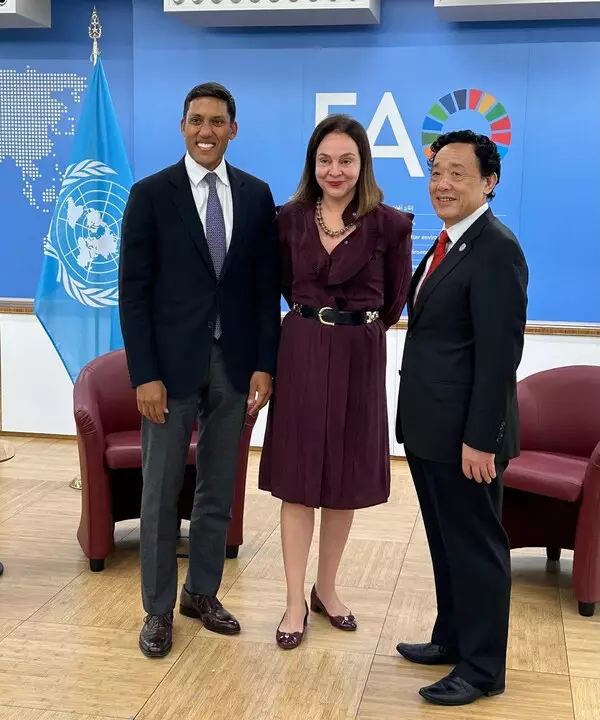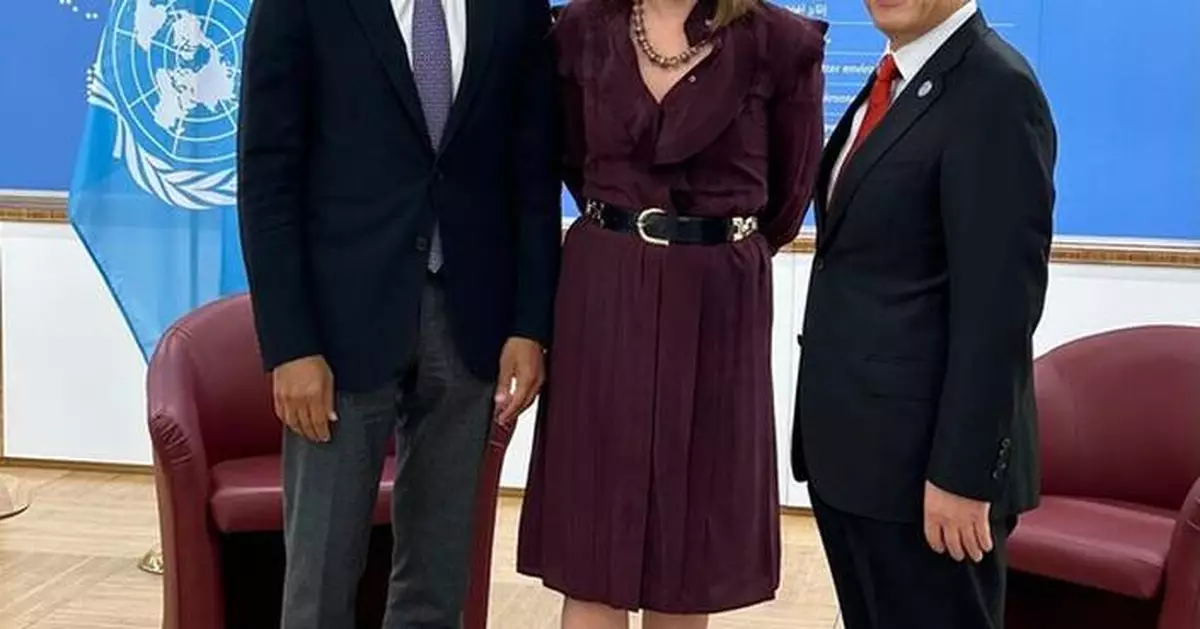ROME, Oct. 4, 2024 /PRNewswire/ -- The Rockefeller Foundation became the first philanthropy to join the Global Alliance Against Hunger and Poverty (Global Alliance) at an event today with its President Rajiv Shah, the Brazilian Ambassador to the Rome-based Agencies, Carla Barroso Carneiro, and The Food and Agriculture Organization Director-General QU Dongyu. The Global Alliance, one of the hallmarks of the Brazil's G20 presidency, aims to quickly channel resources towards effective programs that reduce poverty and hunger – two Sustainable Development Goals (SDGs) that are currently offtrack. As part of its membership, The Rockefeller Foundation is committing its financial and knowledge support to member countries in their expansion of school meal programs – one of the most beneficial investments countries can make to achieve SDG 1 and 2.
"When I say that, I get emotional, because hunger is not a natural thing. Hunger is something that requires political decision. We leaders cannot look only — and all the time — at those who are close to us. We need to be able to take an X-ray and look at those who are far away, those who cannot get close to palaces, those who cannot get close to ministers," said Luiz Inácio Lula da Silva, President of the Global Alliance Against Hunger and Poverty and President of Brazil, in a speech at the pre-launch of the Global Alliance in July.
"Programs such as Bolsa Família, Food Acquisition and School Meals allow healthy meals to reach the most vulnerable, encourage agricultural production and promote local development. The Global Alliance against Hunger and Poverty was born out of this political will and spirit of solidarity. It will be the most important legacy of Brazil's G20 presidency," President Lula da Silva said in his speech.
School meal programs make a critical impact on the educational outcomes and quality of life for vulnerable children around the world, especially for girls. The World Food Program indicates that school feeding programs can increase enrolment by an average of nine percent while decreasing dropout rates and significantly increasing children's attendance. Research also shows that school feeding programs can have beneficial effects on agriculture, education, health and nutrition, and social protection, with US$ 9 in returns for every US$ 1 invested. As the most extensive social safety net globally, benefiting 418 million children in 2022, school meal programs feed 20 percent of the population one meal per day, and can also be a powerful demand driver for climate-resilient, regeneratively produced agriculture.
"Everyone deserves access to healthy food and economic opportunity. That's why we invite other institutions to join The Rockefeller Foundation in supporting the Global Alliance Against Hunger and Poverty," said Dr. Rajiv J. Shah, President of The Rockefeller Foundation. "As part of the Alliance, we hope to help countries expand their school meal programs, which can help improve nutrition for millions of children while driving demand for more locally grown, regenerative agriculture," said The Rockefeller Foundation President Rajiv Shah.
The Rockefeller Foundation is comitted to supporting a healthier way to produce, purchase, and consume what it calls "good food" that is accessible by all and good for the planet. Since 2021 it has focused on generating support and building momentum for expanding climate-resilient school meal programs, alongside the World Food Program, The School Meals Coalition and other partners. The Rockefeller Foundation is working to support countries to improve their school meal programs to achieve climate impacts. Working with producers, corporations, investors, philanthropy and governments, The Rockefeller Foundation aims to align incentives and investment opportunities that support farmers in underserved markets through their regenerative transitions.
The Permanent Representative of Brazil to FAO, IFAD and WFP, Ambassador Carla Barroso Carneiro, on behalf of the Brazilian Government, expressed her gratitude to The Rockefeller Foundation for its commitment to the Global Alliance.
"The Rockefeller Foundation's leadership in advancing sustainable solutions for vulnerable populations, especially in the realm of nutritious school meals, strengthens Brazil's efforts to fight these global challenges and to ensure that effective, long-term, evidence-based solutions reach those most in need," said Carla Barroso Carneiro, Ambassador and Permanent Representative of Brazil to the UN Rome Based Agencies.
As part of the Global Alliance, The Rockefeller Foundation expects to provide financial resources, technical assistance, capacity building support, as well as knowledge and data with member countries that are implementing school meal programs. In partnership with others, The Rockefeller Foundation will also work towards supporting large scale, country-owned implementation of policies and programs.
The Food and Agriculture Organization states, "FAO is pleased to welcome The Rockefeller Foundation as the first philanthropic entity to join the Global Alliance Against Hunger and Poverty. The Rockefeller Foundation support for climate-resilient regenerative school meals through the Global Alliance will increase the implementation of this policy instrument at scale, directly reducing hunger and malnutrition while promoting the transformation of agrifood systems, building resilience to climate change and strengthening smallholder family farmers. FAO is keen to work with Brazil, The Rockefeller Foundation and all other members of the Alliance to end poverty and achieve Zero Hunger."
Open to all interested stakeholders, the Global Alliance will strive to generate collective action and mobilize resources to eradicate hunger and poverty, aligning efforts and financing from both public and private sources.
About The Rockefeller Foundation:
The Rockefeller Foundation is a pioneering philanthropy built on collaborative partnerships at the frontiers of science, technology, and innovation that enable individuals, families, and communities to flourish. We make big bets to promote the well-being of humanity. Today, we are focused on advancing human opportunity and reversing the climate crisis by transforming systems in food, health, energy, and finance. For more information, sign up for our newsletter at www.rockefellerfoundation.org/subscribe and follow us on X @RockefellerFdn and LI @the-rockefeller-foundation.
About The Food and Agriculture Organization:
The Food and Agriculture Organization (FAO) is a specialized agency of the United Nations that leads international efforts to defeat hunger. Our goal is to achieve food security for all and make sure that people have regular access to enough high-quality food to lead active, healthy lives. With 195 members - 194 countries and the European Union, FAO works in over 130 countries worldwide.
** The press release content is from PR Newswire. Bastille Post is not involved in its creation. **

Rockefeller Foundation Joins G20 Global Alliance Against Hunger and Poverty to Advance Climate-Resilient School Meals










